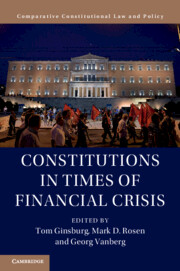Book contents
- Constitutions in Times of Financial Crisis
- Constitutions in Times of Financial Crisis
- Copyright page
- Contents
- Contributors
- Foreword
- I The Role of Constitutions in Dealing with Crises
- 1 Introduction: Liberal Constitutions During Financial Crises
- 2 Financial Emergencies
- 3 Rule-of-Law Objections to the Lender of Last Resort
- 4 Balanced Budget Provisions in Constitutions
- 5 Legislatures and Constitutions in Times of Severe Financial Crisis
- II Courts and Crises
- III Supranational Governance and Crisis
- IV Implementing Austerity
- V The Effect of Crises on Constitutions
- Index
5 - Legislatures and Constitutions in Times of Severe Financial Crisis
from I - The Role of Constitutions in Dealing with Crises
Published online by Cambridge University Press: 08 June 2019
- Constitutions in Times of Financial Crisis
- Constitutions in Times of Financial Crisis
- Copyright page
- Contents
- Contributors
- Foreword
- I The Role of Constitutions in Dealing with Crises
- 1 Introduction: Liberal Constitutions During Financial Crises
- 2 Financial Emergencies
- 3 Rule-of-Law Objections to the Lender of Last Resort
- 4 Balanced Budget Provisions in Constitutions
- 5 Legislatures and Constitutions in Times of Severe Financial Crisis
- II Courts and Crises
- III Supranational Governance and Crisis
- IV Implementing Austerity
- V The Effect of Crises on Constitutions
- Index
Summary
The constitutions of all liberal democracies contain provisions that constrain economic policy. Some provisions grant rights. For example, the United States constitution’s contract clause provides that states shall not “pass any Law impairing the Obligation of Contracts.” 1 Other provisions are structural rather than rights-conferring, such as balanced budget requirements.
This chapter considers how constitutional provisions designed to constrain economic policy should affect a legislator’s decision-making during times of severe financial crisis. The chapter focuses on rights-granting constitutional provisions, though it also briefly considers the implications of the analysis for structural provisions. The chapter explains why unqualified constitutional language, which may appear to absolutely bar the legislature from undertaking a certain course of action, need not always be given literal effect. This means that legislatures have some leeway to infringe constitutional rights. But there is a cost to this degree of freedom: when legislators contemplate infringing a constitutional right, they cannot act as they are permitted to in the course of ordinary politics.
- Type
- Chapter
- Information
- Constitutions in Times of Financial Crisis , pp. 71 - 92Publisher: Cambridge University PressPrint publication year: 2019



